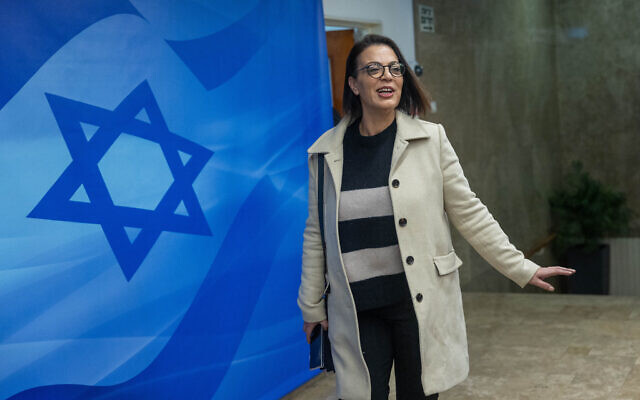Prime Minister Benjamin Netanyahu on Sunday brushed off an 80,000-strong rally the night before against the government’s controversial plans to reconfigure the judiciary, telling cabinet ministers that the national election was the biggest show of public will.
Changes in the pipeline include weakening the Supreme Court so that it is unable to veto legislation and policies deemed unconstitutional, and giving the government control over the body that selects judges.
Critics say that along with other planned legislation, the sweeping reform would affect Israel’s democratic character by shaking up the system of checks and balances, giving too much power to the executive branch, and leaving minorities defenseless.
Two months ago there was a huge demonstration, the mother of all demonstrations. Millions took to the streets to vote in the elections. One of the main issues they voted on was reforming the judicial system, Netanyahu said of the November 1 vote, according to a statement from his office.
“Everyone who was in our election rallies, in city centers, in neighborhoods, heard the voices rising from the crowds,” he said at the weekly cabinet meeting in Jerusalem, though he did not give a specific example.
Millions took to the streets to vote in the elections. “One of the main issues they voted on was reform of the judicial system,” Netanyahu told the ministers.
Israelis demonstrate against the government of Prime Minister Benjamin Netanyahu, in Tel Aviv, January 14, 2023 (Jack Guez / AFP)
He urged Netanyahu not to “get carried away with inciting slogans about civil war and the destruction of the state.”
He added, “I must say that when we were in the opposition, we did not call for civil war and did not talk about the destruction of the state, even when the government took decisions that we strongly opposed. I expect the leaders of the opposition to do the same.”
He predicted that the changes would “restore public confidence in the justice system”.
Rhetoric about reforms and backtracking against them intensified last week when opposition lawmaker Benny Gantz accused Netanyahu of “leading toward civil war,” and opposition leader Yair Lapid urged supporters of his Yesh Atid party to take to the streets as part of the “war on war.” our house.”
This prompted one of the representatives of the far-right “Otzma Yehudit” party in the coalition to call for the arrest of Gantz and Lapid on charges of “treason”.
On Sunday, Likud MK Tali Gottlev said she had asked Justice Minister Yariv Levin, a pioneer of judicial change, to remove Supreme Court Chief Justice Esther Hayut from her position, citing a conflict of interest.
Pointing to a speech Hayut gave last week in which she criticized the planned moves, Gottliffe accused justice of creating panic in the public with lies, “while expressing a political opinion on a disputed topic.”
Meanwhile, President Isaac Herzog Politicians called “To lower the temperature” in their talk about the overhaul. On Sunday, Herzog said he was working to mediate between the two sides on the upcoming legislation.
A group of Saturday protest organizers said they were planning a new demonstration on January 21, albeit on Kaplan Street in Tel Aviv near the government complex that houses the IDF headquarters – rather than Habima Square – in order to allow more people to attend. Attendance in a residential area is somewhat lower.
“The journey to stop this coup has just begun,” organizers said in a statement. “This is a determined, relentless fight to save democracy, and the people of Israel are coming out in droves to protest.”
But in a separate statement, the Movement for Quality Government in Israel, one of the main protest organizers, said it plans to hold a rally in Habima Square on Saturday night.
“Together we will continue to lead and organize this struggle for the character and identity of the State of Israel as a democratic and liberal state,” said the head of the Movement for Quality Government, Eliad Shraga. “We will fight in the streets, squares and bridges – in the courts and in the Knesset.”
power transfer
On Sunday, the Cabinet approved the creation of a Ministry of Public Diplomacy, headed by the Ministry of Foreign Affairs newly appointed minister Galette Distel Atbaryan. Likewise, the Cabinet approved the installation of May Golan as a minister in the Prime Minister’s Office. Both steps still require Knesset approval.

Diplomacy Minister Galit Distel Al-Atbarian arrives for a cabinet meeting at the Prime Minister’s Office in Jerusalem, January 15, 2023. (Yonatan Sindel/Flash90)
The ministers also approved the members of the Ministerial Committee for Legislation, which Levin will chair.
Other members of the forum are Minister of National Security Itamar Ben Gvir, Minister of Education Yoav Kisch, Minister in the Education Ministry Haim Biton, Minister in the Welfare Ministry Yoav Ben-Zur, Minister of Housing Yitzhak Goldknopf, Minister of Environmental Protection Edit Silman, and Minister of Communications Shlomo. Karhi, and Minister of Expatriate Affairs and Social Equality Amichai Shkli, along with Destel Atbarian.
It was also agreed to “transfer areas of operations and powers from the Ministry of Education and the Ministry of Social Equality to the Prime Minister’s Office in accordance with the coalition agreements,” according to the Prime Minister’s Office statement.
According to Channel 12 news, the decision referred to the transfer of external programs for school students from the Ministry of Education to the Prime Minister’s Office, where they will be supervised by Deputy Minister Avi Maoz, leader of the far-right, anti-LGBT Noam party. .
Maoz’s appointment as supervisor of a key component of the student curriculum sparked an outpouring of criticism and concern, with Many Local municipalities say they will not allow anti-LGBTQ or illiberal content in their schools.

“Incurable bacon nerd. Lifelong tv aficionado. Writer. Award-winning explorer. Evil web buff. Amateur pop culture ninja.”

